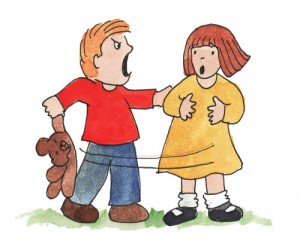 When a child takes a toy from another child, he should be corrected. He has ignored another person’s rights. He has not treated the other child in the way he himself would like to be treated. When this happens, the wronged child – the one who has lost his toy – will probably yell or cry. When this happens, it is easy, as parents, to focus on him because he is making the most noise. We may be tempted to correct him for not being willing to share, when we should actually be correcting the child who took the toy.
When a child takes a toy from another child, he should be corrected. He has ignored another person’s rights. He has not treated the other child in the way he himself would like to be treated. When this happens, the wronged child – the one who has lost his toy – will probably yell or cry. When this happens, it is easy, as parents, to focus on him because he is making the most noise. We may be tempted to correct him for not being willing to share, when we should actually be correcting the child who took the toy.
The child who took the toy has, in essence, stolen. It is a childish form of stealing, certainly not like the premeditated theft of an older child or adult. But he has, as the dictionary defines stealing, “take[n] “the property of another or others without permission or right, especially secretly or by force.” The same root sin of self-centeredness is present in the one-year-old and in the teenager who both want something and wrongfully take it.
Consistent discipline for the “small” acts of thievery committed by little children will prevent a hardening of conscience that could lead to greater selfishness, greed, and theft in later years. What does God say about stealing?
“You shall not steal.” (Exodus 20:15)
We can teach this commandment to very little children. With babies who start to grab things from older siblings’ hands, we can say, “No, give the toy back to your brother.” We can guide him through the motions of giving back the toy, and discipline him if he resists our instruction. He will not understand much more than this, but he can understand that he needs to obey as you guide him in returning the toy. And he can learn to say (or sign) the word “please,” so that he is prepared to do the right thing the next time he would like a turn with a toy.
With a toddler, we can say, “God says, ‘You shall not steal.’ You are taking something that is not yours. That is what God calls stealing. You need to give it back.” Again, if he refuses, he needs to be disciplined. This is a good time to also review what he should have done instead of taking the toy from the other child. Remind him to ask politely for a turn the next time, and to be patient and content if he has to wait.
As the child continues to grow, he should learn to confess his sin when he has taken something from someone else. Ask him what God thinks of what he has done. Discipline him for stealing. Ephesians 4:28 says the thief shouldn’t steal anymore. Instead he should work so he can give to others, instead of taking from them. Give him some work to do, either for you or for his “victim.”
Lead him in confessing his wrong. “I’m sorry. I was wrong (or more accurately, ’I was sinning’) when I took that toy from you. That’s not the way I would want to be treated. Will you forgive me?” as he gives the item back. Ask him what he will do or say the next time he wants something someone else has. Should he ask politely? Should he be patient? Should he simply be content with what he already has? Should he remember another commandment, “Thou shall not covet?”
With prayer and consistency, we can teach our children to treat others the same way they want to be treated. This means honoring the rights of others, putting themselves in the other person’s place, not taking what belongs to someone else, and also being ready to be generous with what they have, willingly sharing with others. Next week, we’ll look at the child who needs to share.

2 Trackbacks